June marked the 25th Anniversary of Gramercy! Thank you to our valued investors, trusted business partners and team members without whom this milestone could not have been reached. We are excited for the opportunities we see ahead, and look forward to continuing to deliver upon our mission to have a positive impact on the well-being of our clients, portfolio investments (and their communities) and our team members.
Contents
Market Overview
Macro Review
The Waller Effect was a sizeable market event. Governor Waller was the first Fed official to highlight increasing confidence that policy is well positioned to slow the economy and get inflation back to 2%. He simultaneously stated that there is a possibility of an interest rate cut in the first half of next year. His underlying view is that 3-5 months of disinflation will allow the Federal Reserve more flexibility. It was a symbolic speech given his seniority with Chair Powell and Governor Logan, but also because it was the first occasion where the Central Bank have opened the door to policy cuts more explicitly. As such, weaker 2-year and 7-year Treasury auctions were ignored. The market also paid little attention to stronger 3Q annualized GDP growth at 5.2%. Under the surface, we remain in a weaker USD environment, which has seen gold rise to a 6-month high and oil regain some strength. For oil, the OPEC+ meeting led to members cutting production by a further 1m barrels per day, albeit on a voluntary basis. However, there continues to be disagreement over whether Angola and Nigeria are sticking to the cuts, as Saudi Arabia have become more frustrated. In Europe, the picture of decelerating inflation is similarly a theme. Both German and French inflation surprised to the downside, but the ECB’s Lagarde has had a tougher time persuading the market that it is “not the time to start declaring victory”, even if a full interest cut is priced in for April. These measures have seen the Bloomberg Global Bond Index record its best month since 2008 (+5.5%), as the VIX fell to a post-pandemic low of 12.4 and the S&P 500 delivered its best month since July 2022 (+8.9%).
EM Credit Update
Emerging markets sovereign credit (cash bonds) ended the week up 0.3% with credit spreads 10bps wider. U.S. Treasuries rallied 6-21bps over the past week. Sovereign outperformers were Pakistan, Vietnam and Colombia, while Zambia, Argentina and Ukraine underperformed. A successful Chinese property restructuring from SUNAC saw bonds re-enter emerging market indices, just as sentiment began to improve with new policy measures. While Vanke was downgraded to high yield and becomes the tenth fallen angel this year, up from six in 2022 and nine in 2021, these events are relatively insignificant as the sector is stressed. Finally, there was also plenty of focus on Panama’s Supreme Court after declaring First Quantum’s concession was unconstitutional, which follows a tough stance that the incumbent President has taken over the company into a pivotal 2024 election.
The Week Ahead
With Fedspeakers in blackout ahead of the next FOMC, there ought to be more focus on the Friday payrolls report. The big debate is over whether it will show labor market softening and trigger recession indicators. Elsewhere, China’s exports and imports are set to pick up, but one will have to consider base effect distortions given the impact of the slump in 2022. Central bank holds are expected from Australia (4.35%), India (6.5%), Kenya (10.5%) and Poland (5.75%). Lower GDP readings are expected in Australia and South Africa, but Brazil’s economy may have contracted in 3Q. Within the mix, we can also expect inflation reports from Chile, Colombia, Hungary, Japan, Mexico, Turkey, Russia and South Korea.
Highlights from emerging markets discussed below: Argentina’s President-elect Milei visits the U.S., confirms Luis Caputo will be Economy Minister, Ecuador’s new administration tables tax reform during first week in office and Supreme Court decision on Panama’s First Quantum mining contract should appease social unrest.
Fixed Income

Equities
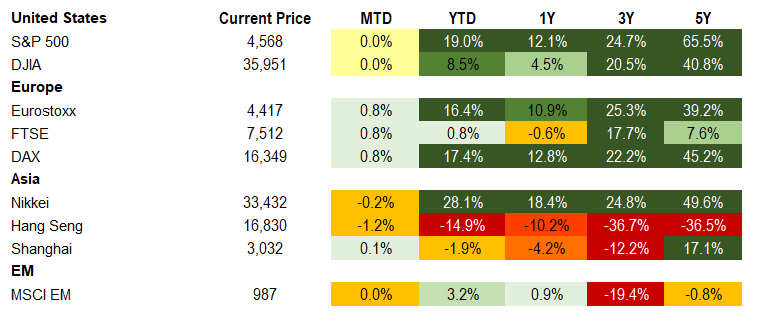
Commodities

Source for data tables: Bloomberg, JPMorgan, Gramercy. EM Fixed Income is represented by the following JPMorgan Indicies: EMBI Global, GBI-EM Global Diversified, CEMBI Broad Diversified and CEMBI Broad High Yield. DM Fixed Income is represented by the JPMorgan JULI Total Return Index and Domestic High Yield Index. Fixed Income, Equity and Commodity data is as of December 1, 2023 (mid-afternoon).
Emerging Markets Weekly Highlights
Argentina’s President-elect Milei visits the U.S., confirms Luis Caputo will be Economy Minister
Event: Argentina’s President-elect Javier Milei led a small delegation on a visit to the U.S. this week. It included Luis Caputo who served as Central Bank Governor under President Macri in 2018 and has now been confirmed by Milei as the incoming Economy Minister.
Gramercy Commentary: Mr. Caputo is considered to be close to former President Mauricio Macri and is seen as a pragmatic and market-friendly choice by Milei. Caputo’s appointment as Economy Minister could also be a sign that plans to dollarize the economy, the President-elect’s most controversial economic policy proposal, could be delayed and/or modified in a credit-positive direction. During their visit to the U.S., Milei and his team met with representatives from the Biden Administration, the IMF, as well as the private sector to discuss the incoming administration’s key policy priorities and potential new funding sources to support its ambitious reform/liberalization agenda. While additional material funding by the IMF appears unlikely at this stage, Managing Director Kristalina Georgieva assured that the Fund remains keen to support Argentina and that the new government could be able to tap the recently established Resilience and Sustainability Trust (RST). Overall, we note that signals by both Milei’s transition team and international stakeholders continue to lean constructively from a market perspective and should remain supportive for bond valuations in the near-term.
Ecuador’s new administration tables tax reform during first week in office
Event: As signaled during recent meetings with investors in New York, one of President Noboa’s first policy actions after assuming office last week was to submit a fast-track economic bill to the National Assembly that targets a significant increase in tax collection. Meanwhile, Noboa appointed Juan Carlos Vega, a U.S.-educated economist with a long career in Ecuador’s private sector, as his Finance Minister.
Gramercy Commentary: Amid Ecuador’s challenging fiscal situation, President Noboa’s insistence during recent meetings with global investors on sparking GDP growth through tax cuts worried markets, triggering renewed downside pressure on the sovereign bond complex. In this context, the planned increase of tax collection of up to $800mn (0.7% of GDP) could go a long way in reassuring markets about the fiscal prudence of the new administration. As such, to the extent the proposed tax reform is approved and implemented successfully, it should mitigate fiscal risks until the next election cycle in early 2025. Furthermore, we believe that the appointment of Juan Carlos Vega as Finance Minister to replace Noboa’s original choice of a much younger and less experienced person is also a welcomed development for markets. Despite Noboa’s improbable credit-positive victory over his populist opponent in the recent snap presidential elections, sovereign debt valuations have remained under pressure and potential near-term gains hinge on improvement in the fiscal and external financing outlook.
Supreme Court decision on Panama’s First Quantum mining contract should appease social unrest
Event: Following weeks of large-scale protests against the contract renewal between Panama’s government and Canadian miner First Quantum for exploitation of one of the world’s largest copper mines, the Supreme Court ruled this week that the contract was unconstitutional.
Gramercy Commentary: The Supreme Court’s ruling to revoke the mining contract does not come as a surprise given the current social and political environment in the country. The decision carries various credit risks for Panama from a fiscal, growth and sovereign rating perspective, among others. However, we would argue that most of those risks are already well reflected in bond valuations as BBB-rated Panama has transitioned to trade wide of many liquid BB-rated sovereigns, foreshadowing a likely downgrade to a sub-IG level by at least one rating agency in the near future. Looking ahead, Panama faces presidential and general elections in May 2024. The general outlook for mining in the country and the ultimate fate of Panama’s relationship with First Quantum likely hinge on the tone of the pre-election campaigns as well as if the next administration would be able and/or willing to renegotiate the now defunct contract in a way that addresses voter concerns while preserving Panama’s credit health.
Emerging Markets Technicals
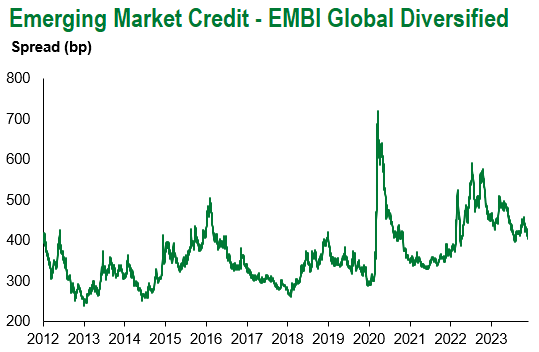
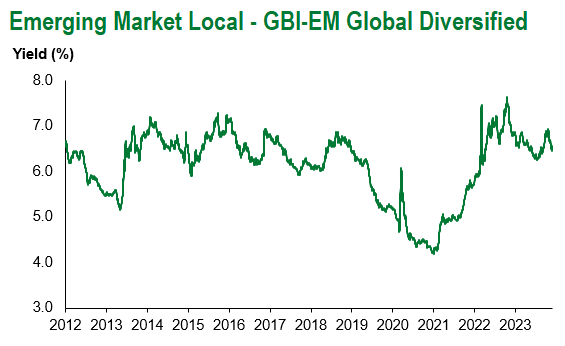
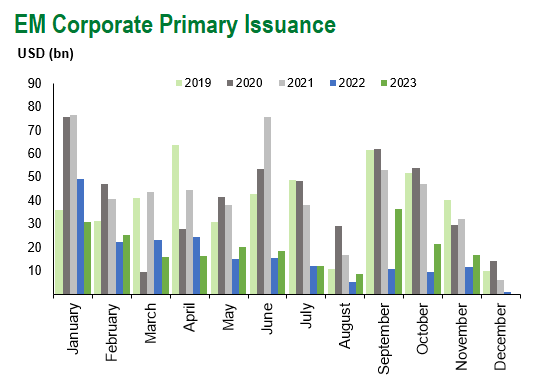
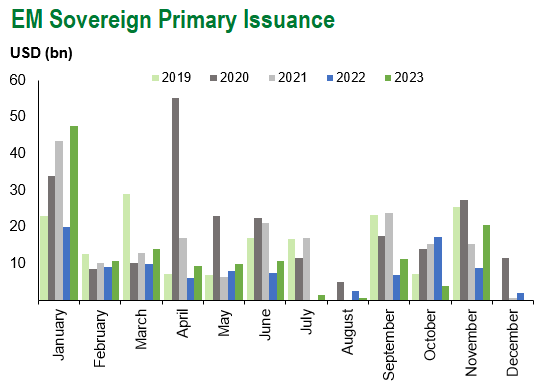
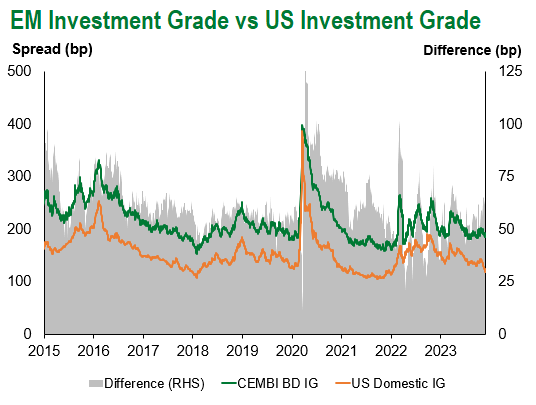
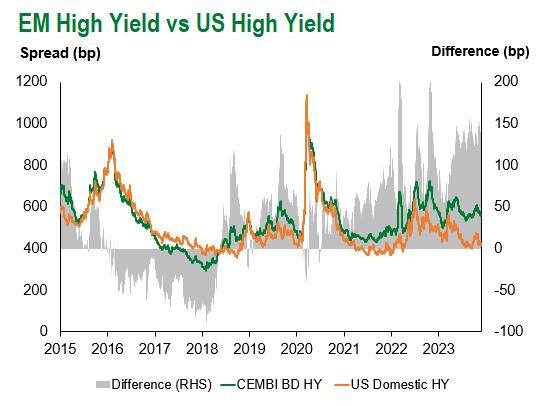
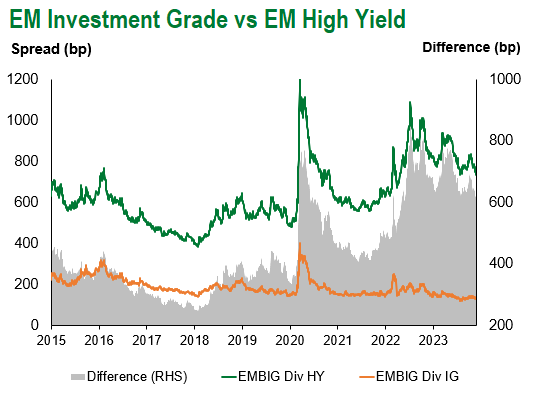
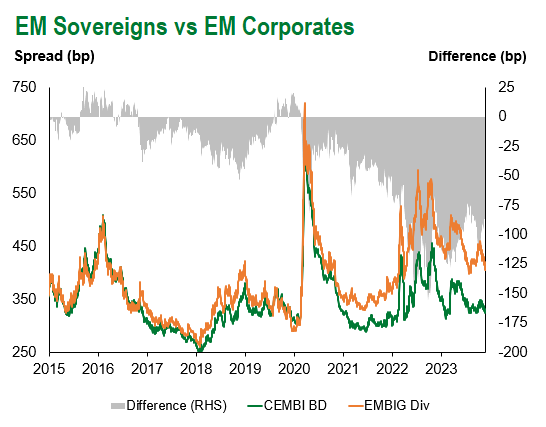
Emerging Markets Flows
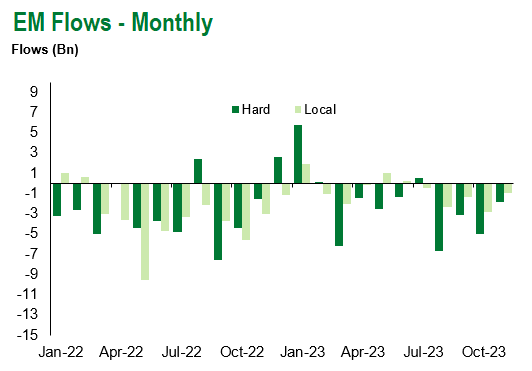
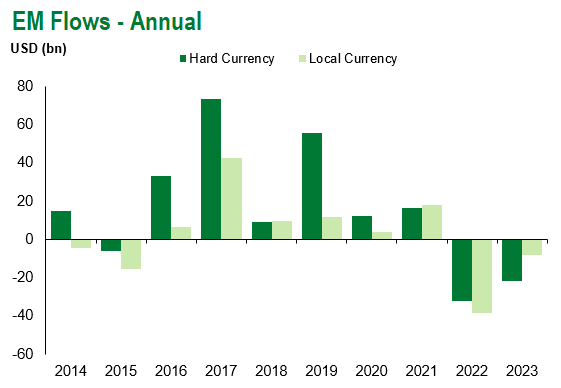
Source for graphs: Bloomberg, JPMorgan, Gramercy. As of December 1, 2023.
For questions, please contact:
Kathryn Exum, CFA ESG, Director, Co-Head of Sovereign Research, [email protected]
Petar Atanasov, Director, Co-Head of Sovereign Research, [email protected]
James Barry, Director, Deputy Portfolio Manager, [email protected]
This document is for informational purposes only. The information presented is not intended to be relied upon as a forecast, research or investment advice, and is not a recommendation, offer or solicitation to buy or sell any securities or to adopt any investment strategy. Gramercy may have current investment positions in the securities or sovereigns mentioned above. The information and opinions contained in this paper are as of the date of initial publication, derived from proprietary and nonproprietary sources deemed by Gramercy to be reliable, are not necessarily all-inclusive and are not guaranteed as to accuracy. This paper may contain “forward-looking” information that is not purely historical in nature. Such information may include, among other things, projections and forecasts. There is no guarantee that any forecasts made will come to pass. Reliance upon information in this paper is at the sole discretion of the reader. You should not rely on this presentation as the basis upon which to make an investment decision. Investment involves risk. There can be no assurance that investment objectives will be achieved. Investors must be prepared to bear the risk of a total loss of their investment. These risks are often heightened for investments in emerging/developing markets or smaller capital markets. International investing involves risks, including risks related to foreign currency, limited liquidity, less government regulation, and the possibility of substantial volatility due to adverse political, economic or other developments. References to any indices are for informational and general comparative purposes only. The performance data of various indices mentioned in this update are updated and released on a periodic basis before finalization. The performance data of various indices presented herein was current as of the date of the presentation. Please refer to data returns of the separate indices if you desire additional or updated information. Indices are unmanaged, and their performance results do not reflect the impact of fees, expenses, or taxes that may be incurred through an investment with Gramercy. Returns for indices assume dividend reinvestment. An investment cannot be made directly in an index. Accordingly, comparing results shown to those of such indices may be of limited use. The information provided herein is neither tax nor legal advice. Investors should speak to their tax professional for specific information regarding their tax situation.
